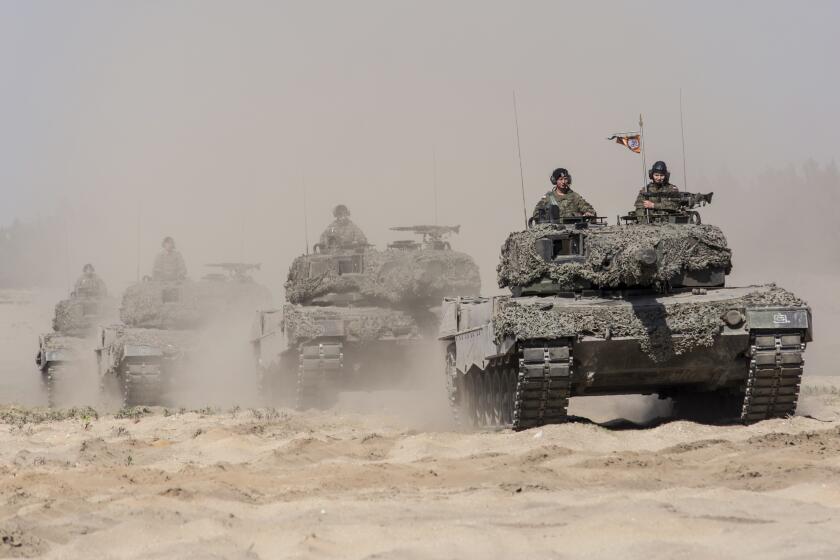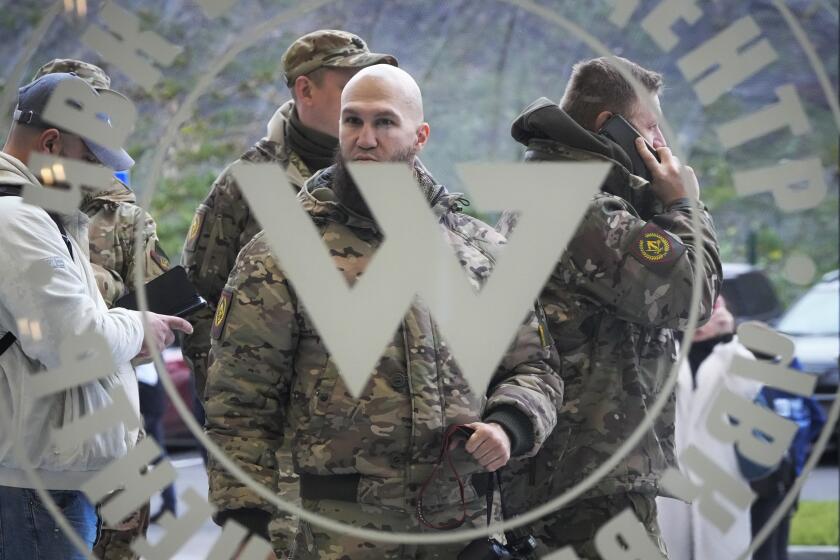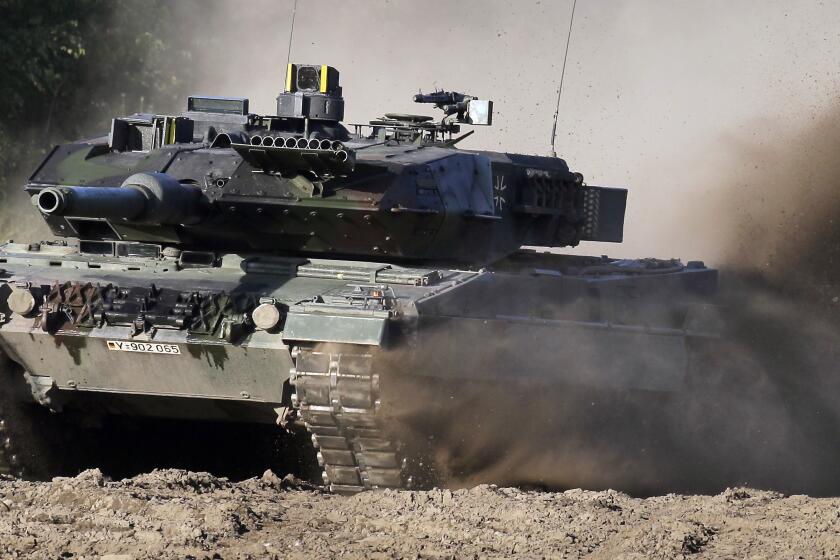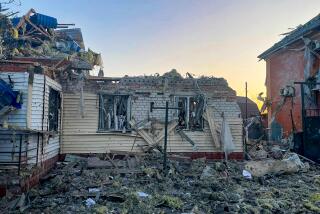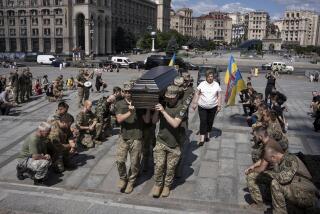10 killed in latest Russian shelling in Ukraine, officials say
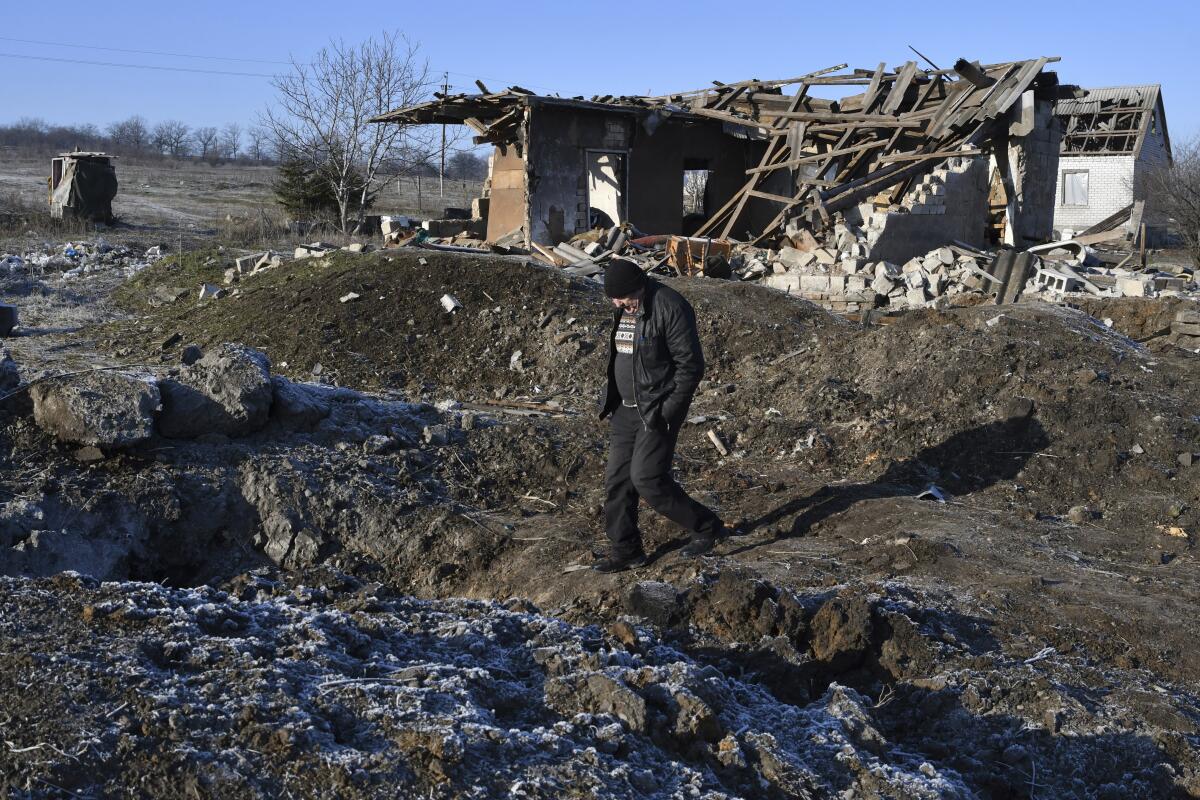
- Share via
KYIV, Ukraine — Russian shelling killed at least 10 Ukrainian civilians and wounded 20 others in a day, Ukraine’s presidential office said Friday, as the country worked to recover from an earlier wave of missile strikes and drone attacks.
Regional officials said towns and villages in the east and south within reach of the Russian artillery suffered most. Six people died in the Donetsk region, two in Kherson and two in the Kharkiv region. A day earlier, missiles and self-propelled drones launched by Russian forces had struck deeper into Ukrainian territory, killing at least 11 people.
The bombardments followed announcements by the U.S. and Germany of plans to ship powerful combat tanks to help Ukraine defend itself. Other Western countries said they also would share tanks from their stockpiles.
Moscow has bristled at the move and accused Western nations of entering a new level of confrontation with Russia.
Donetsk Gov. Pavlo Kyrylenko said the Russian military used fiercely burning phosphorus munitions in its shelling of the village of Zvanivka, about 12 miles north of Bakhmut, a city that has become the focus of a grueling standoff in recent months. The shelling also damaged apartment buildings and two schools in the nearby town of Vuhledar, Kyrylenko said.
The governor of the neighboring Luhansk region, Serhiy Haidai, said Ukrainian shelling hit two Russian bases in the occupied towns of Kreminna and Rubizhne, killing and wounding “dozens” of Russian soldiers. His claim couldn’t be independently verified.
The wariness over military involvement that made Germany hesitate to send tanks to Ukraine is rooted in the country’s memories of World War I and II.
Further south, Russian troops resumed shelling the town of Nikopol, across the Dnipro River from the Russian-held Zaporizhzhia nuclear power plant, damaging apartment buildings, gas pipelines, power lines and a bakery, officials said.
Separately on Friday, Russian authorities took new steps in their months-long and widely criticized effort to graft four Ukrainian provinces onto Russia’s already vast territory. They said the annexed provinces would change from the time zone that covers Kyiv to the one in Moscow.
The time switch in the Ukrainian southern and eastern regions that Russia illegally declared as part of its territory four months ago — Donetsk, Luhansk, Zaporizhzhia and Kherson — will take place “in the near future,” Russia’s Ministry of Industry and Trade said. The move comes as part of what the ministry called the “gradual synchronization” of Russian legislation after the “admission of the four subjects.”
Russian President Vladimir Putin’s highly orchestrated announcement of the illegal annexations in September came despite widespread international condemnation and the fact that Russia didn’t fully control the areas it annexed. Russia claims to control nearly all of Luhansk and about half of Donetsk.
The Biden administration is expanding sanctions against Russia’s Wagner Group, related companies and individuals for their role in the war in Ukraine.
Less than 1½ months after the annexations, Russia lost control of the city of Kherson and broad swaths of the surrounding territory following a Ukrainian counteroffensive. Kherson was the only regional capital Russia had seized since starting its invasion Feb. 24, 2022, and its loss dealt a heavy blow to the Kremlin.
Planned Western deployments of modern tanks for Ukraine remained on many minds Friday.
Polish Prime Minister Mateusz Morawiecki told Canada’s CTV that his country was ready to send 60 tanks — half of them the PT-91 model, which was built in Poland from 1994 to 2001 as a modernized version of the Soviet-era T-72M1. He said those deliveries would come on top of Poland’s plans to send 14 of its Leopard 2s, after Berlin approved the export by allies of the German-made tanks to Ukraine.
On Friday, Russian Foreign Ministry spokeswoman Maria Zakharova said the supply of Western tanks to Ukraine would not change the situation in Kyiv’s favor, but would rather “bring the countries of the West to a new level of confrontation with our country and our people.”
Germany may soon approve deliveries of high-tech Leopard 2 tanks that Ukraine and others hope will boost Kyiv’s fight against Russian invaders.
The German government insisted Friday that it does not see itself in direct conflict with Russia, after Moscow seized on comments by Germany’s top diplomat this week that suggested otherwise.
During a debate Tuesday with lawmakers at the Parliamentary Assembly of the Council of Europe, German Foreign Minister Annelena Baerbock said it was important for European countries to avoid a “blame game” when it comes to discussing support for Ukraine “because we are fighting a war against Russia and not against each other.”
Asked about those comments, German government spokeswoman Christiane Hoffmann referred to a line laid out by German Chancellor Olaf Scholz and told reporters in Berlin on Friday that “the chancellor has always emphasized that NATO and Germany are not parties to this war of attack by Russia against Ukraine.”
“We support Ukraine, but we are not parties to the war,” she added.
News Alerts
Get breaking news, investigations, analysis and more signature journalism from the Los Angeles Times in your inbox.
You may occasionally receive promotional content from the Los Angeles Times.
German officials also said their country was targeted by a series of cyberattacks of apparent Russian origin this week following the decision to supply tanks to Ukraine. A spokeswoman for the Interior Ministry said the so-called denial-of-service attacks, in which websites or entire networks are bombarded with requests in an attempt to make them inaccessible, were observed Wednesday and Thursday, and “were largely fought off or had no serious impact.”
Meanwhile, Ukrainian air force spokesman Yurii Ihnat said Russia used its latest hypersonic Kinzhal missiles to strike energy facilities in the Kyiv and Zaporizhzhia regions Thursday. He said Ukraine lacks defenses against the Kinzhal, adding that Russia has few such missiles and mostly uses them against priority targets.
Ihnat said in televised remarks that Russia also used Kh-55 missiles — air-launched missiles that were designed to carry nuclear warheads — with dummy warheads to distract Ukraine’s air defenses.
And Russian state-run media say that the Moscow’s state communications watchdog has restricted access to the CIA and FBI websites for allegedly spreading materials “containing inaccurate socially significant information” and “discrediting” Russia’s armed forces. The Russian government has made it illegal to discredit its troops or spread “false information” about the military.
More to Read
Sign up for Essential California
The most important California stories and recommendations in your inbox every morning.
You may occasionally receive promotional content from the Los Angeles Times.
